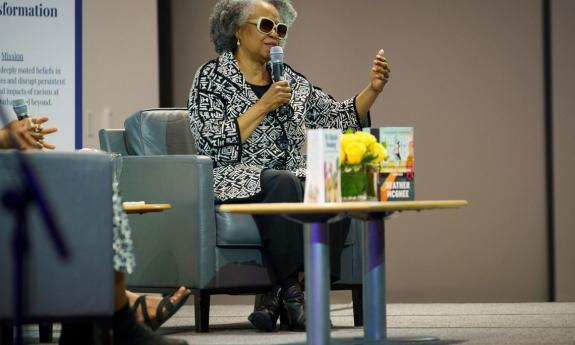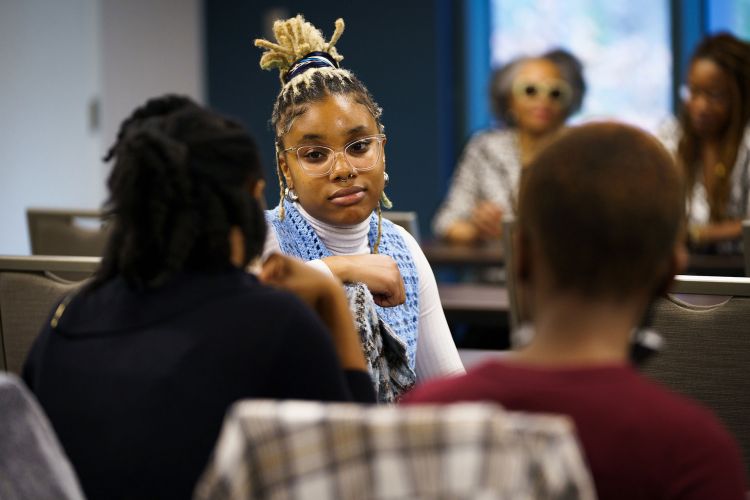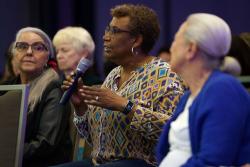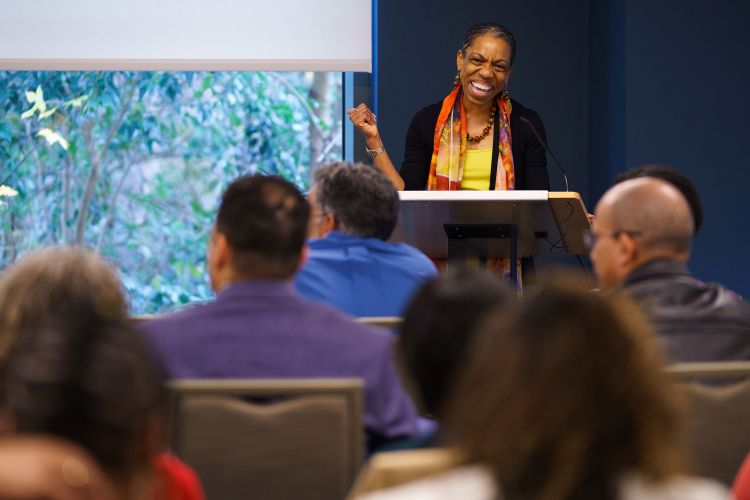Seeking 'The Solidarity Dividend' of Racial Healing
Duke community gathers to hear how racial healing can move America forward

Moving Toward Solutions

The event was tied with UNIV 101: Let’s Talk About Race, a university-wide course that was piloted last year as part of Duke’s ongoing efforts to advance racial equity. During a lunch open to UNIV 101 students, Christopher and McGhee answered questions about grassroots advocacy and organizing, how to sustain activism post-graduation or in the face of indifference, and how much to focus on interpersonal racism versus structural racism in the fight for a more just world.
“I was so excited for today,” said first-year student Kyle MacLellen. “Reading their books for class was so interesting and then being able to be that close and interact with them on a personal level was very special. I liked how closely the books connected with what we did over the semester and it was not just discussing problems, but solutions. And I love that this was the end – this would be our last day of class and this is a good moving forward point.”
Christopher and McGhee also spoke to the Duke Racial Equity Advisory Council (REAC) during an early afternoon panel. Christopher noted that it’s important to ensure that racial equity efforts align with an organization’s mission. She added that with the president and Board of Trustees backing the work, Duke is off to a good start. But leadership needs continuous feedback.
“Focus on what you have control over,” she told those in the room. “Bring your excellence to that and then show collective progress.”
Building Connections

How does one end up pursuing racial healing as one’s life’s work? For Christopher, it was the loss of her first-born child that pushed her to study the health inequities that lead to higher rates of infant mortality among Black women. She focused on social determinants of health: how the environments in which we live in contribute to – or damage – our wellbeing.
Christopher created the Truth, Racial Healing & Transformation (TRHT) process while serving as senior advisor and vice president of the W. K. Kellogg Foundation. TRHT seeks to reshape communities, first through truth-telling and relationship-building, and then through pursuing systemic change.
“Let’s build the coalitions, the critical mass, the supermajority we need in a democracy to sustain whatever we accomplish,” Christopher said. “Then you can come up with strategies for fixing the systems that are broken.”
Christopher and McGhee emphasized that fighting racism has benefits for everyone. McGhee calls this the “Solidarity Dividend” in her bestselling book, “The Sum of Us: What Racism Costs Everyone and How We Can Prosper Together.”
When asked about the relationship of racism to climate change, McGhee said that the same people who believed that they were at the top of a racial “hierarchy of value” also tended to believe that they wouldn’t be affected by climate change – “that the sea levels won’t rise to them.”

“This idea that we don’t all live under the same sky is an illusion,” she said.
While reparations are often viewed within a “zero-sum framework” – as a benefit to some and a cost to others – McGhee says she does not see it that way. “I see reparations as seed capital for the nation we are becoming.”
Furthermore, she says, “I don’t get how you can see how Black wealth was stripped, stolen, built up and taken away again without seeing how better off economically we would be if every family had a little more of that cushion of wealth.”
Citing the State of California’s decision to return “Bruce’s Beach” to the descendants of the Black family from whom it was wrongfully taken nearly 100 years ago, she said, “There’s no statute of limitations for making it right.”
Experiencing a Better World

According to Christopher, empathy is a necessary precursor to healing the wrongs of the past. This involves “developing the capacity to see ourselves in one another, to love one another, to care for one another.”
McGhee shares such stories of racial solidarity in her book as well as her Higher Ground-produced podcast, also titled “The Sum of Us.”
McGhee said she had an “a-ha” moment when she realized the difference between racial equity trainings and racial healing. While racial equity trainings are designed to help people grasp the differences resulting from racism, she said, “the racial healing methodology is about having people experience the desired state. Being in our difference is not the desired state—the desired state is our common humanity.”
Sponsors of the event included the Office for Faculty Advancement, Office of Undergraduate Education, Duke Health, Kenan Institute for Ethics, Duke Arts, Social Science Research Institute, Office of Interdisciplinary Studies, Office for Institutional Equity, Racial Equity Advisory Council, Trinity College of Arts & Sciences, Department of African & African American Studies and Duke Alumni Engagement and Development.
Editor's Note
Kathryn Kennedy of Trinity Communications and Landy Elliott of the Office of Undergraduate Education contributed to this article. All photos by John West of Trinity Communications.
